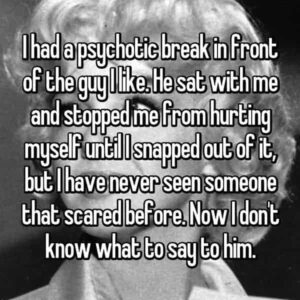
Such warning signs often point to a person’s deteriorating health, and a physical and neurological evaluation can help find the problem. Strong and inappropriate emotions or no emotions at all.Persistent, unusual thoughts or beliefs that can’t be set aside regardless of what others believe.Hearing, seeing, tasting or believing things that others don’t.Signs of early or first-episode psychosisĭetermining exactly when the first episode of psychosis begins can be hard, but these signs and symptoms strongly indicate an episode of psychosis: Strong, inappropriate emotions or having no feelings at all.Spending a lot more time alone than usual.A decline in self-care or personal hygiene.Suspiciousness or uneasiness with others.Trouble thinking clearly or concentrating.A worrisome drop in grades or job performance.Early warning signs include the following:

It's important to get help quickly since early treatment provides the best hope of recovery by slowing, stopping and possibly reversing the effects of psychosis. In this case, families can find the situation extremely difficult, but there are engagement strategies to help encourage a person to seek help. However, a person's willingness to accept help is often complicated by delusions, fears, stigma and feeling unsettled. While such signs should not be cause for alarm, they may indicate the need to get an assessment from a doctor.Įncouraging people to seek help for early psychosis is important. Families are often the first to see early signs of psychosis and the first to address the issue of seeking treatment. Usually, a person has gradual, non-specific changes in thoughts and perceptions, but doesn't understand what's going on. Early warning signs can be difficult to distinguish from typical teen or young adult behavior. What is Early and First-Episode Psychosis?Įarly Psychosis: What's Going on and What Can You Do?Įncouraging People to Seek Help for Early PsychosisĮarly Intervention: Tips for School Staff and Coaches Symptoms Early warning signs before psychosisĮarly psychosis or FEP rarely comes suddenly. Don’t wait to take the first step and prepare yourself with information by reviewing these tip sheets: As many as 3 in 100 people will have an episode at some point in their lives.Įarly or first-episode psychosis (FEP) refers to when a person first shows signs of beginning to lose contact with reality. Acting quickly to connect a person with the right treatment during early psychosis or FEP can be life-changing and radically alter that person’s future. In the U.S., approximately 100,000 young people experience psychosis each year. Psychosis is a symptom, not an illness, and it is more common than you may think. While everyone’s experience is different, most people say psychosis is frightening and confusing. These disruptions are often experienced as seeing, hearing and believing things that aren’t real or having strange, persistent thoughts, behaviors and emotions. Psychosis is characterized as disruptions to a person’s thoughts and perceptions that make it difficult for them to recognize what is real and what isn’t. Most people think of psychosis as a break with reality. Note: Content includes discussions on topics such as suicide attempts and may be triggering. Ken Duckworth guides discussions on early psychosis that offer insights from individuals, family members and mental health professionals.

In this 2-part podcast series, NAMI Chief Medical Officer Dr. What to Avoid with Psychiatric MedicationsĮCT, TMS and Other Brain Stimulation Therapies Methylphenidate or Dexmethylphenidate (Concerta, Ritalin and others) Metabolic Side Effects of Psychiatric Medicationsĭextromethorphan and Bupropion (Auvelity)

Glitchy Genes and Psychiatry: The Impact of DNA On Medication Therapy


 0 kommentar(er)
0 kommentar(er)
